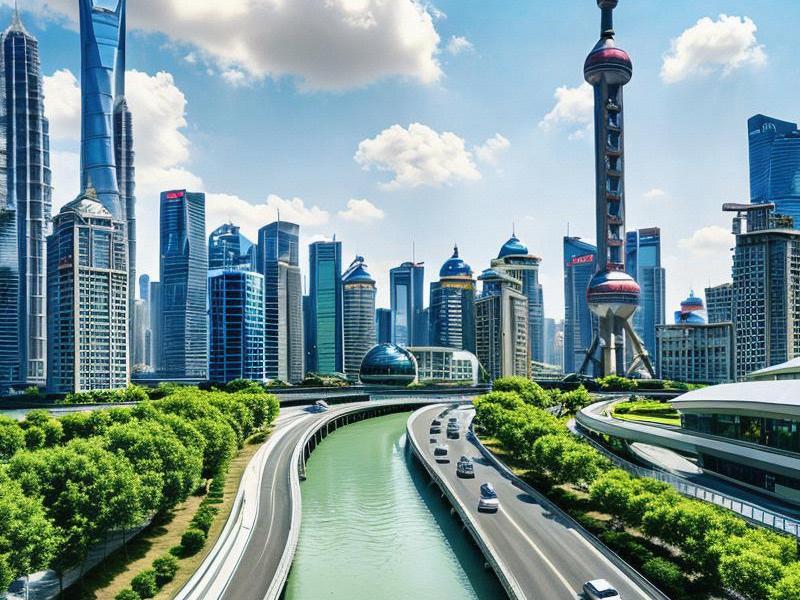This article delves into the remarkable transformation of Shanghai, exploring its journey towards becoming a global hub of innovation and sustainability. It highlights the city's efforts in urban planning, technological advancements, environmental protection, and cultural preservation.

Shanghai, the vibrant metropolis on the banks of the Huangpu River, has long been a symbol of China's rapid economic development. Over the past few decades, it has undergone a profound transformation, evolving from a traditional port city into a global center of innovation and sustainability. This article takes a closer look at the key factors that have driven this transformation and the challenges Shanghai continues to face.
Urban Planning and Infrastructure
One of the cornerstones of Shanghai's transformation has been its visionary urban planning. The city has invested heavily in modern infrastructure, including high-speed rail networks, subways, and smart city technologies. The Shanghai Maglev Train, the world's first commercial high-speed magnetic levitation train, is a testament to the city's commitment to cutting-edge transportation solutions.
The expansion of the Shanghai Metro system has also been remarkable, with over 20 lines serving millions of residents and visitors daily. This extensive network not only facilitates seamless travel but also reduces traffic congestion and air pollution. Additionally, Shanghai has implemented smart city initiatives, leveraging big data, artificial intelligence, and the Internet of Things (IoT) to enhance urban management and improve the quality of life for its citizens.
Technological Advancements
Shanghai has emerged as a global hub for technological innovation, attracting top-tier talent and fostering a thriving startup ecosystem. The city is home to several world-class research institutions and technology parks, such as the Zhangjiang Hi-Tech Park and the Shanghai漕河泾新兴技术开发区 (Xinzheng Technology Development Zone). These hubs have become breeding grounds for groundbreaking advancements in fields like artificial intelligence, biotechnology, and renewable energy.
上海私人品茶 The Chinese government's "Made in China 2025" initiative has further accelerated Shanghai's technological ambitions. The city has embraced智能制造 (smart manufacturing) and 工业4.0 (Industry 4.0) concepts, focusing on the integration of advanced technologies into manufacturing processes. This has positioned Shanghai as a leader in the global manufacturing sector, driving economic growth and creating high-quality jobs.
Environmental Protection and Sustainability
As one of the world's largest cities, Shanghai faces significant environmental challenges. However, the city has taken proactive measures to address these issues and promote sustainability. The Shanghai Green Building Regulations, introduced in 2014, have set stringent standards for energy efficiency and environmental performance in new construction projects. These regulations have spurred the development of eco-friendly buildings and neighborhoods, contributing to the city's overall sustainability goals.
Shanghai has also invested heavily in renewable energy projects, including solar and wind power installations. The city's offshore wind farm, located in the East China Sea, is one of the largest in the world, generating clean energy for millions of residents. Additionally, Shanghai has implemented waste management programs aimed at reducing landfill usage and promoting recycling.
The Huangpu River, a vital part of Shanghai's identity, has undergone significant environmental restoration efforts. The city has launched initiatives to improve water quality, restore wetlands, and enhance biodiversity along the riverbanks. These efforts have not only improved the ecological health of the river but also provided residents with more opportunities for recreation and leisure.
Cultural Preservation and Global Influence
爱上海同城对对碰交友论坛
Despite its rapid modernization, Shanghai has managed to preserve its rich cultural heritage. The city is home to numerous historical landmarks, such as the 外滩 (The Bund) and 豫园 (Yuyuan Garden), which offer a glimpse into its colonial past and traditional Chinese architecture. Efforts have been made to protect and restore these sites, ensuring that future generations can appreciate Shanghai's unique history.
Shanghai has also emerged as a global cultural hub, hosting international events like the 上海国际电影节 (Shanghai International Film Festival) and the 上海时装周 (Shanghai Fashion Week). These events attract artists, designers, and audiences from around the world, showcasing Shanghai's vibrant cultural scene and fostering international cultural exchange.
The city's influence extends beyond the arts, with Shanghai playing a key role in global economic and political affairs. As a member of the G20 and the Asia-Pacific Economic Cooperation (APEC), Shanghai contributes to shaping global policies and addressing pressing issues such as climate change, trade, and economic development.
Challenges and Future Prospects
While Shanghai has achieved remarkable success, it continues to face several challenges. The rapid urbanization process has led to issues such as housing shortages, traffic congestion, and environmental degradation. Addressing these challenges requires innovative solutions and sustainable development strategies.
上海龙凤419 One of the key challenges is managing the city's population growth. Shanghai's population has surpassed 24 million, putting immense pressure on infrastructure and public services. The city has implemented measures to control population growth, such as stricter residency permits and housing policies. However, finding a balance between economic development and quality of life remains a pressing issue.
Another challenge is reducing air pollution and improving environmental quality. While significant progress has been made, Shanghai still faces challenges in combating air pollution from industrial activities, vehicle emissions, and construction projects. Continued investment in green technologies and stricter environmental regulations will be essential in achieving long-term sustainability.
Looking ahead, Shanghai's future prospects are bright. The city is poised to become a global leader in innovation, sustainability, and cultural exchange. Continued investment in infrastructure, technology, and environmental protection will drive Shanghai's growth and enhance its global standing.
Moreover, Shanghai's strategic location and strong economic foundation make it an ideal hub for international cooperation and trade. The city's efforts to strengthen its position in the global economy, such as the development of the 上海自贸区 (Shanghai Free Trade Zone), will further enhance its competitiveness and attract foreign investment.
In conclusion, Shanghai's transformation is a testament to the city's resilience, innovation, and commitment to sustainability. From its visionary urban planning and technological advancements to its environmental initiatives and cultural preservation efforts, Shanghai has set a benchmark for other cities around the world. As the city continues to evolve, it will undoubtedly play a pivotal role in shaping the future of China and the global community.